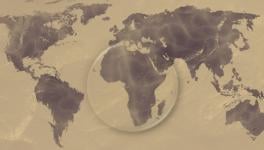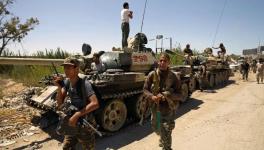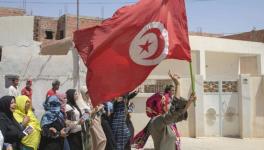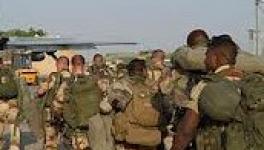Libya: Mission Regime Change
The crisis in Libya now is not that of protecting civilians from Gaddafi's attacks, the reason originally advanced for military intervention. It is now clearly regime change. The western powers – primarily the US, France and the UK – are now providing air cover to the rebel forces and also imposing not only a no-fly zone but also a no-drive zone on the Gaddafi forces. Though the resolution UNSC 1973 called for an arms embargo on Libya and an immediate ceasefire, the western powers are currently arming the rebel forces and encouraging them to attack Gaddafi-held territories, with the western powers providing the muscle. The only part of the UN resolution that the western powers have not yet openly violated is boots on the ground. Here too, it is being argued that as long as the boots on the ground do not constitute an occupation force, they can be there under the UN resolution call “for any other measure”. However, Special Forces of the UK, if not of other countries, appear to be already deep in Libya to help the rebels.
Gaddafi's ability to fight will depend now on two factors. One is his ability to hold his army together under aerial bombardment. The other is the ability of the rebel forces to project their forces into Gaddafi territory with possible western air support. If Gaddafi's forces hold, then taking Gaddafi-held towns will mean a costly war of attrition, where air power will not be of too much help. The longer the Gaddafi forces hold, the more difficult it will be for the coalition – essentially the US, France and the UK – to hang on to their 'regime change' mission.
Already, NATO's taking over command and other allies joining are causing the regime change mission to fray at the edges. Turkey has agreed to join with NATO forces but is also calling for attacks on Gaddafi to stop and negotiations to start on a cease-fire. Russia, China and India have openly criticised the 'mission creep' that western powers are following in Libya. Arab League secretary general Amr Mussa told reporters, "What has happened in Libya differs from the goal of imposing a no-fly zone and what we want is the protection of civilians and not bombing other civilians." This is after Arab League being cited as the key reason for the intervention.
Russia, China and India were not invited in the recent 'international' conclave on Libya held in London. The African Union, Egypt and Saudi Arabia, though invited, did not attend the conference, while Arab League was represented not by Amr Moussa, but an Ambassador representing him. The only high level Arab presence was that of Qatar and United Arab Emirates.
Interestingly enough, the Peace and Security Council of the African Union (AU) had asked the UN to impose a no-fly zone on Somalia. This however did not merit any 'humanitarian' consideration from the international community. Neither has AU's call for a five-point roadmap -- which includes protection of civilians, cessation of hostilities, and implementation of democratic reforms – met with any response.
After having unilaterally changed the UN Mission from one of protecting civilians to taking out the Gaddafi regime, the western powers have very little wiggle room now. If they do not get rid of Gaddafi soon, they are bound to see much greater criticism at home and abroad – Libya will start looking as a third war of occupation that US and its allies would be fighting. Having Gaddafi continue will mean a hostile regime in Tripoli and freeing Gaddafi to take 'any measure' he sees fit to attack the western powers. Having rehabilitated Gaddafi and sold him military hardware worth more than a billion dollar, Gaddafi going back to his old ways is going to give sleepless nights to the west. The issue is not one of terrorism that the west is portraying in the media. The much bigger danger is Libya moving away from the role it has played hitherto in stopping immigration from North Africa into Europe and de-stabilising oil prices.
There are two key problems facing the western powers. One is that the Benghazi rebels lack cohesion and are still very much a rag-tag band. Militarily, they have about 1000 soldiers who have defected from Gaddafi forces; all others are either raw recruits or with dubious antecedents. Even the figures in the Transitional Council are not known – only a fraction of them have been announced – the rest remain shadowy figures.
In the recent fights between rebels and Gaddafi forces, the rebels seem to have made very little distinction between immigrant African workers, and the 'African mercenaries' that Gaddafi supposedly has recruited. One of the reasons for the democratic upsurge weakening in Gaddafi held territories, is also the fear of the Benghazi rebels and their identification with King Idris, who Gaddafi overthrew in 1969. The flag of the current rebellion is the flag Libya used during King Idris's rule. Undoubtedly, the eastern section had lost out in the power struggle in Libya during Gaddafi's rule. Benghazi was always a city in which Gaddafi's hegemony was always weak.
This is not to suggest that Gaddafi's brutal crack-down played no role in crushing the democratic movement. But Gaddafi has been in power so long not just because of his iron fist. He also has the ability to manipulate different sections of the Libyan people for his ends.
We should also not forget that Gaddafi's regime did develop Libya as a whole and did benefit various sections of the people. Libya remains well above any other African country in the Human Development Index, in spite of Gaddafi’s loot of the country.
Regarding the casualties from Gaddafi's crack-down on the rebels, figures differ but the numbers are not different in order of magnitude from that of Israel's attacks on Gaza in 2007 and on Lebanon in 2006. The US not only opposed any condemnation of Israel then, it also blocked calls for cease-fire in the UN to give Israel more time to 'finish' the job. Pointing out the hypocrisy of some of the western proponents of the doctrine of 'right to protect', Stephen Zunes writes:
"The principal intellectual advocate of the Responsibility to Protect is Gareth Evans, former head of the International Crisis Group, who has also emerged as one of the most vocal proponents of what he referred to as “the overwhelming moral case” for military intervention against Gaddafi. Ironically, as Australian foreign minister, Evans was a major defender of Indonesia's genocidal war against East Timor, which took the lives of over 200,000 civilians, and repeatedly downplayed and even covered up for Indonesian war crimes."
If we look at the map of Libya, the battles are all being fought on a narrow swath of territories that encompass the towns on the sea coast. This is where Libya’s entire oil infrastructure exists; whoever controls these towns, control the flow of oil out of Libya. This is why both Gaddafi and the rebel forces have concentrated on coastal towns and not on the hinterland.
Politically, the current 'alliance of the willing' looks more and more threadbare every day. The western media can make much of the presence of Qatar and United Arab Emirates participation in the 'war for democracy' in Libya. The irony of medieval monarchies fighting for democracy – in Libya – while crushing it at home and abroad would not be lost on rest of the world; neither is protecting civilians by bombing population centres under Gaddafi rule. The western media may believe in the pinpoint accuracy of western missiles, but those of us who see the US drone attacks in Pakistan regularly killing innocent men, women and children have a great deal of scepticism on this count.
There has been a lot of discussion in the international left regarding the UN Security Council resolution and the right to protect civilian argument. Some have held that, the only way to prevent a massacre in Libya was to ask for a western military intervention. Others have argued that a 'humanitarian' intervention by the west is a contradiction in terms and only seeks to legitimise its imperialist interventions. However, almost all sections of the international left, the differences on the initial intervention notwithstanding, are now united on opposing the new mission of regime change that the west has manufactured out of the UN resolution.
Undoubtedly, Gaddafi's threat to go 'house to house for traitors' in Benghazi made it difficult for Russia, China, Brazil and India to oppose the UN resolution. If they had stopped the resolution and Gaddafi had indeed massacred his opponents in Benghazi, it would have rebounded badly on these countries. There is little doubt however that their apprehensions regarding the language of the UN resolution 1973 have now been borne out. Mission regime change was always the goal; 'right to protect' civilians was the pretext.
By raising the stakes in Libya from protecting civilians in Benghazi to regime change, the western powers are creating another mess – this time in North Africa. All the fig leaf of UN Security Council and Arab League support is not going to hide from the world the simple fact that the western powers are fighting to put a 'compliant' regime in Libya. The problem here is not winning the war against Gaddafi, but in creating a successful alternative. While the rebels may have united against Gaddafi, it is unlikely that this unity will hold post-Gaddafi. The costs of adding another failed state in the world – after Iraq and Afghanistan -- will be born this time by the Libyans and the North Africans. This is what makes military intervention by the west different. The gains if any – such as oil, getting rid of Soviet forces, etc. are for them. The failures are suffered by the people of countries where such interventions takes place; a simple division – heads we win, tails you lose.
Get the latest reports & analysis with people's perspective on Protests, movements & deep analytical videos, discussions of the current affairs in your Telegram app. Subscribe to NewsClick's Telegram channel & get Real-Time updates on stories, as they get published on our website.























